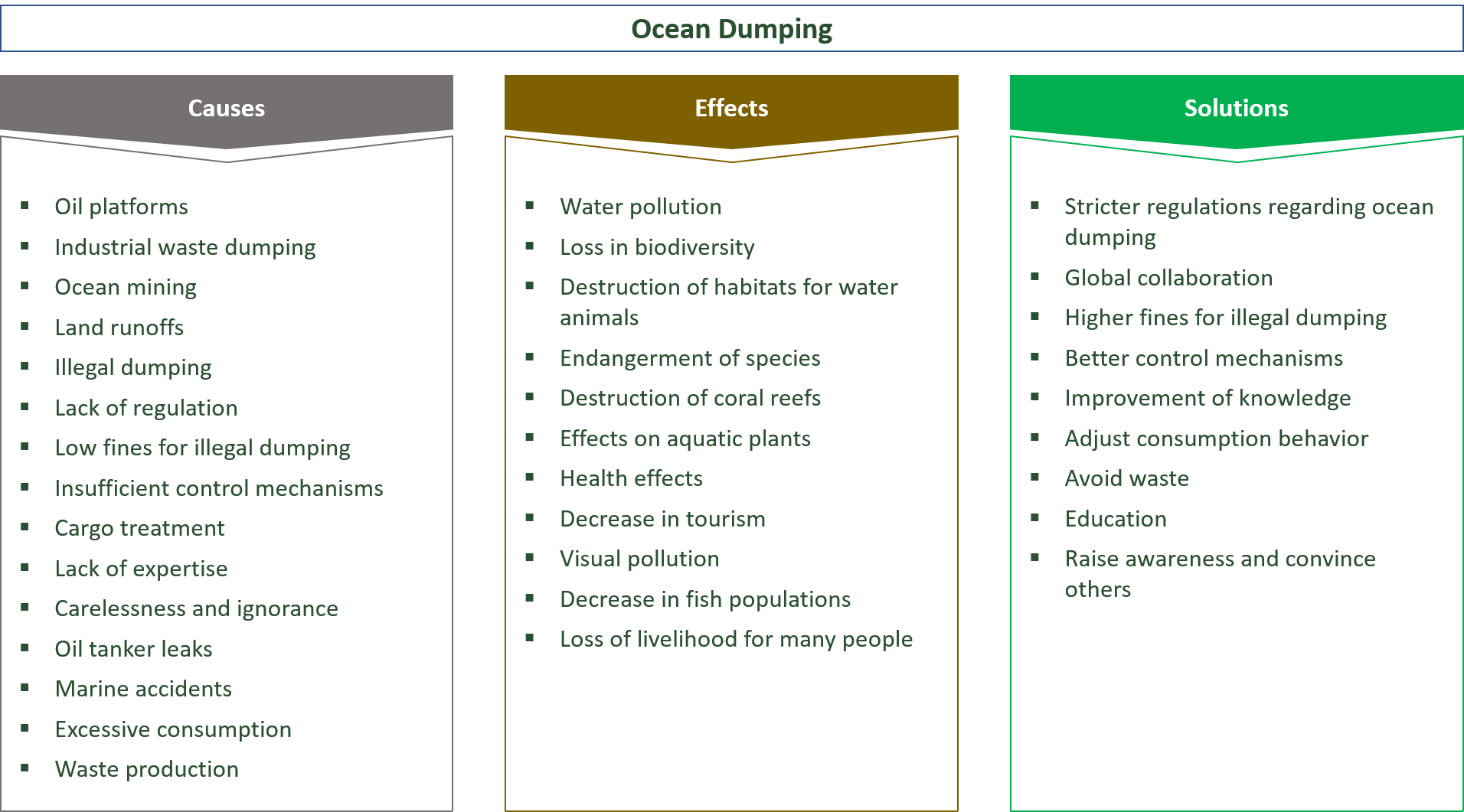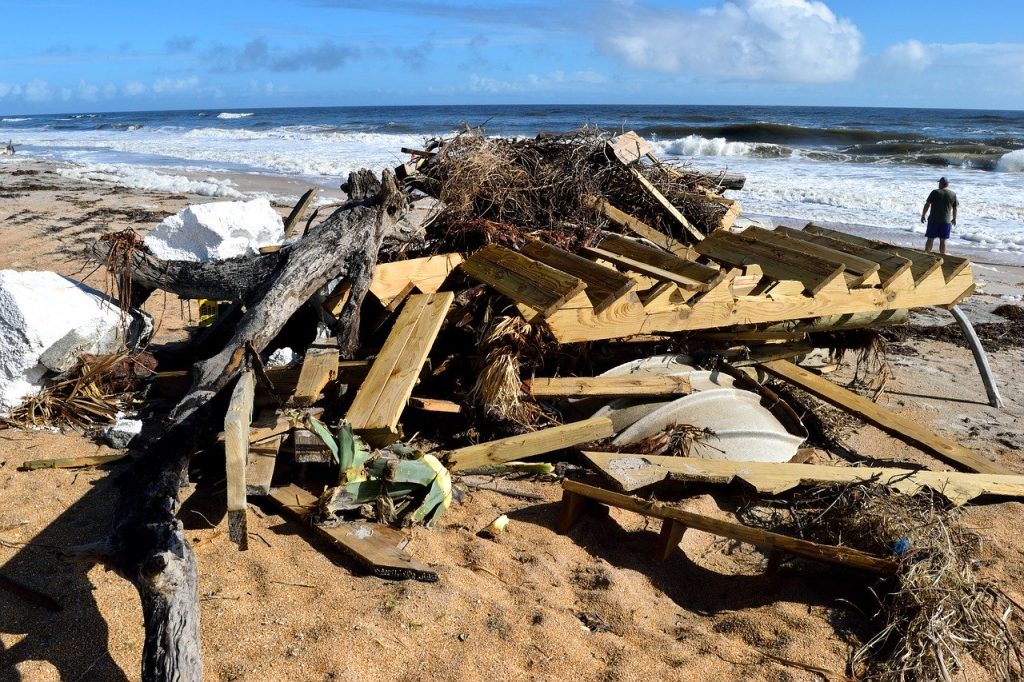“We need to respect the oceans and take care of them as if our lives depended on it. Because they do.”
Sylvia Earle, Scientist
Ocean Dumping: Causes, Effects & Solutions

Ocean dumping (also often referred to as marine dumping) can be defined as the deliberate disposal of waste into our oceans.
Ocean dumping can have severe adverse effects on our environmental system. It can also cause serious adverse health effects for us humans.
In this article, the causes, effects and solutions for ocean dumping are examined in detail.
Audio Lesson
Contents
Causes for Ocean Dumping
- Oil platforms
- Industrial waste dumping
- Ocean mining
- Land runoffs
- Illegal dumping
- Lack of regulation
- Low fines for illegal dumping
- Insufficient control mechanisms
- Cargo treatment
- Lack of expertise
- Carelessness and ignorance
- Oil tanker leaks
- Marine accidents
- Excessive consumption
- Waste production
Oil platforms
One cause for ocean dumping can be oil spills coming from oil platforms.
For example, plenty of oil is extracted out of the ocean ground with the help of oil platforms.
If there are leaks during the extraction process, significant amounts of oil can be released into our oceans which can have serious adverse effects on a variety of water organisms.
Industrial waste dumping
In many countries with lax regulations, industrial waste is often simply disposed of into our oceans since it is a relatively easy and cost-efficient way to get rid of the trash.
This problem is especially severe in countries that are literally drowning in waste.
Many developed countries ship part of their trash to countries abroad where it should be recycled.
However, due to the excessive amounts of waste that end up in these countries, large amounts of waste are dumped into the ocean in order to get rid of them.
Ocean mining
Ocean mining is another big source of ocean dumping.
Large amounts of trash from ocean mining are disposed into our oceans each day.
This waste can also include toxic by-products from mining activities which can cause serious adverse effects for a variety of water animals and plants.
Land runoffs
There is plenty of waste dumped into rivers and lakes.
This kind of waste is often carried through water bodies over quite long distances, part of it eventually ending up in our oceans where it can lead to significant ocean pollution.
Especially in developing countries, this problem is quite severe since industries often dispose of their trash in nearby lakes or rivers and eventually makes its way into our oceans.
Illegal dumping
Plenty of trash is dumped in our oceans every day without the permission of governments or local authorities.
In many countries, industries just dispose of large amounts of waste into our oceans since it is a fast, easy and cost-efficient way to get rid of the waste compared to disposing it on official waste disposal sites.
Thus, illegal dumping can be a big source for ocean dumping.
Lack of regulation
In many countries, there are no or just inefficient regulations regarding ocean dumping in place.
In these countries, industries can dispose of their waste in large amounts into our oceans without the fear of getting fined.
There are some countries that have stricter regulations regarding ocean dumping in place.
For instance, the U.S. introduced the Ocean Dumping Act in 1972 which aims to regulate the disposal of trash in the ocean.
However, many countries lack those acts, which gives industries an incentive to continue to dispose of excessive amounts of waste into our oceans.
Low fines for illegal dumping
Even in countries where ocean dumping is regulated, there are often just low fines for illegal ocean dumping in place.
This gives industries incentives to continue to dump our oceans since they do not have to fear high fines even if they get caught.
Thus, low fines for illegal dumping are another cause for the issue of ocean dumping.
Insufficient control mechanisms
In many countries, there are also simply insufficient control mechanisms regarding ocean dumping in place.
Plenty of the waste can be disposed into our oceans since local authorities are simply overwhelmed with the problems since they do not have enough manpower to control ocean dumping practices on a regular basis.
Cargo treatment
Cargo ships usually care many containers.
Sometimes, they carry more than would be allowed and reasonable.
If a cargo vessel is excessively loaded, it can happen that due to heavy storms and waves, part of the cargo will fall from the ship into the ocean.
Depending on the freight, this can lead to serious water pollution if the cargo contains harmful or even toxic substances.
Lack of expertise
In some cases, workers are just not trained well and therefore make terrible decisions when it comes to waste disposal.
They may simply decide to dump harmful material into our ocean in order to get rid of it since they do not have enough expertise to comprehend the adverse environmental effects of such actions.
Carelessness and ignorance
Some people and industries also simply do not care about the protection of our oceans and just continue to dump their trash into our oceans in order to behave profit-maximizing.
They may not take into account the significant adverse effects and the resulting social costs for our environmental system at all.
Thus, ignorance and carelessness can also exacerbate the issue of ocean dumping and its adverse effects on our ecosystems.
Oil tanker leaks
Oil is often carried over quite long distances.
During this time, leaks may occur which can lead to significant oil spills.
If those leaks occur during the nighttime, large amounts of oil can enter our oceans since it will workers take until the sun is rising to recognize the problem.
It is hard to estimate how much oil is spilled into the oceans due to oil tanker leaks since ships will often simply not report any issues related to that.
However, due to the high number of oil tankers in our oceans, the problem of oil spills from leaks can be tremendous.
Marine accidents
In case of heavy storms and huge waves, there may be marine accidents which may result in cargo ships and oil tankers go belly-up.
This may result in significant ocean dumping since all the cargo and oil will sink to the ocean ground and pollute the water.
Although marine accidents are not that common, even a single accident can have large adverse effects due to the large amounts of oil and other harmful substances that can enter the ocean.
Excessive consumption
Excessive consumption is another issue that can be indirectly linked to ocean dumping.
In our current society, especially in the Western world, consumption levels skyrocketed during the last decades.
Since the average income has increased significantly, people are able to afford more material goods.
However, the production of material goods also involves the transportation of resources over quite long distances.
This also includes shipping large amounts of resources.
The shipping of resources like oil can in turn lead to serious pollution in case of accidents or leaks.
Waste production
Another related problem to excessive consumption is the production of large amounts of waste.
Since many of our daily life items are packaged into plastic, our consumption behavior leads to the production of excessive amounts of waste.
In order to get rid of this waste, it is often shipped to foreign countries where poor countries try to recycle it.
The worthless part of this waste is often just dumped into the ocean since it is an easy and rather cheap method to dispose of the trash.
Thus, our waste production also contributes to significant levels of ocean dumping.

Effects of Ocean Dumping
- Water pollution
- Loss in biodiversity
- Destruction of habitats for water animals
- Endangerment of species
- Destruction of coral reefs
- Effects on aquatic plants
- Health effects
- Decrease in tourism
- Visual pollution
- Decrease in fish populations
- Loss of livelihood for many people
Water pollution
Ocean dumping can lead to serious water pollution.
Especially the dumping of industrial waste in our oceans can be quite harmful since this kind of waste often contains harmful or even toxic components that can enter the water.
Moreover, the release of oil into the ocean can be extremely harmful to many animals, plants and all other kinds of aquatic life.
Therefore, water pollution can be a serious result of ocean dumping.
Loss in biodiversity
Since many water animals and plants suffer from ocean dumping and the resulting ocean pollution, these entities are likely to decrease in population since their natural living conditions are altered in an adverse manner.
Many sea organisms react quite sensitive to changes in living conditions and may die off.
Thus, ocean dumping can lead to a severe loss in biodiversity, especially in regions where ocean dumping activities are quite high.
Destruction of habitats for water animals
Oceans are complex ecosystems where animals, plants and other water organisms depend on each other.
If the populations of some species decrease due to ocean dumping and the resulting water pollution, other animals may also suffer since their source of food diminished.
For example, dolphins eat large amounts of smaller fishes in order to survive.
If the population of smaller fishes decreases due to water pollution, also the population of dolphins will likely decrease due to food shortage.
This process could end up in the destruction of whole habitats since some water animals will simply no longer find enough food and may have to leave the polluted areas in order to survive.
Endangerment of species
Some species may also become endangered or even go extinct due to ocean dumping and its related adverse effects.
This is especially true for animals which only occur in a few areas on our planet.
For instance, if a specific species of turtles only occurs in a small ocean area, if this area becomes polluted from ocean dumping, this turtle species may go extinct since its natural habitat has been destroyed.
Destruction of coral reefs
Ocean dumping may also contribute to the destruction of coral reefs.
Corals are living organisms which are usually quite sensitive to their natural living conditions.
If through ocean dumping, these conditions are altered in an adverse manner, corals may suffer or even die off.
This is especially true when it comes to the dumping of toxic waste into our oceans.
Corals will not be able to protect against these toxic substances and will decrease in population.
Effects on aquatic plants
Aquatic plants may also suffer from ocean dumping.
Since plants are not able to relocate to other areas if their natural habitats are polluted, they have no protection against water pollution resulting from ocean dumping.
Therefore, many plants may die off if the concentration of harmful substances becomes too high in the respective ocean area.
Health effects
Ocean dumping can also cause severe health effects for humans.
The trash that is dumped into our oceans will release harmful substances into the water which leads to water pollution.
Fishes will consume this water and may become contaminated with toxic substances.
Since humans eat plenty of fish each year, these harmful substances will eventually end up in our bodies and may cause serious health issues.
Moreover, large amounts of fine plastic particles have been found in fishes.
These plastic particles will also end up in our bodies once we consume fish.
Decrease in tourism
Ocean dumping may also lead to a decrease in tourism for the affected countries.
Imagine a beach polluted with large amounts of trash.
Would you want to spend your precious vacation time there? I don’t think so!
Since part of the trash that is dumped into our oceans will eventually end up on beaches, tourism in these areas will decrease dramatically since people will switch to other parts of the world where they can enjoy their vacation on clean beaches rather than on polluted ones.
Visual pollution
Visual pollution may be another adverse effect of ocean dumping.
Since part of the trash that had been dumped into our oceans may end up on remote parts of our planet, locals as well as tourists may suffer from visual pollution.
People usually like clean landscapes and pure nature. Plastic trash on the beaches and in the water will downgrade the experience and the living standards for many people in the affected areas.
Decrease in fish populations
Since ocean dumping can lead to the pollution of large areas of water, fish populations are likely to drop significantly in the affected areas.
This may lead to ecosystem imbalance since ecosystems are quite fragile and depend on each other.
If a species drops in numbers, other species may also be affected by this decline.
Loss of livelihood for many people
Due to a decline in fish populations, many people around the world may lose their livelihood since many locals still rely on fishing as their single source of income.
If fish populations drop in numbers, fishermen may no longer be able to catch enough fish to survive and may have to relocate to other areas or may even be forced to migrate in order to find a better future.

Solutions for Ocean Dumping
- Stricter regulations regarding ocean dumping
- Global collaboration
- Higher fines for illegal dumping
- Better control mechanisms
- Improvement of knowledge
- Adjust consumption behavior
- Avoid waste
- Education
- Raise awareness and convince others
Stricter regulations regarding ocean dumping
Although, depending on the respective country, there are some regulations regarding ocean dumping in place (like the Ocean Dumping Act in the U.S.), the overall worldwide regulation concerning this topic is still far too low.
In many developing countries, industries are allowed to dump large amounts of waste into our oceans.
We have to stop this lax regulation and need all countries to implement sufficient regulation in order to mitigate the issue of ocean dumping and its related adverse effects.
Global collaboration
Countries should work together to improve global measures in order to prevent ocean dumping.
Every country has an incentive to dump excessive amounts of waste into the ocean since it will expose negative externalities on other countries but will just have to bear its private costs.
This means that if there is no global collaboration, each country has the incentive to pollute our oceans up to a level that is excessive on a global scale.
Therefore, countries have to implement a global ceiling regarding ocean dumping in order to reduce ocean dumping.
Higher fines for illegal dumping
Illegal dumping is a big problem in the context of ocean dumping since harmful or even toxic substances may enter our oceans.
In many countries, fines for illegal ocean dumping are still quite low.
This gives many companies an incentive to dump their industrial waste into the ocean since they know that even if they get caught, the fines will be quite low.
Better control mechanisms
Another measure in order to prevent ocean dumping and its adverse effects is to implement better control mechanisms.
If there are insufficient controls, industries will continue to dump excessive amounts of waste in our oceans since they know that the probability that they get caught is quite low.
Thus, local authorities have to provide funds to employ more people that can improve the control mechanisms related to ocean dumping.
Improvement of knowledge
People who are employed in the waste disposal sector and are responsible for dumping waste into the ocean have to improve their knowledge on the topic in order to prevent the disposal of hazardous material into our oceans.
Many workers may still not be aware of which materials can cause severe water pollution.
Thus, by improving the knowledge of those workers, they may refrain from dumping harmful or even toxic substances into our oceans.
Adjust consumption behavior
Our consumption behavior indirectly contributes to significant ocean dumping.
Since the resources that are needed in the manufacturing process of material goods are often shipped over quite long distances, accidents and leaks in those production processes may lead to ocean dumping and may pollute the water to a significant extent.
Thus, if we reduce our consumption, we can also reduce ocean pollution to a significant extent.
Avoid waste
In our daily life, we produce large amounts of waste on a regular basis.
If we buy stuff in conventional stores, it is often covered in plastic or other packaging.
Moreover, also our food is often wrapped in plastic wrapping.
In order to avoid the waste resulting from this packaging behavior, we should buy our food and other products for daily use in stores that refrain from plastic packaging.
By doing so, we could reduce the overall amount of waste that is produced and eventually dumped into our oceans to a certain extent.
Education
Education is key when it comes to fighting ocean dumping.
We have to show people the adverse effects of ocean dumping and how we can contribute to an improvement of the situation.
We should start this education quite early in school since children are more likely to adjust their behavior compared to adults.
Moreover, since children have a big impact on the buying decisions of their parents, parents will also become more aware of the problem and may also behave more environmentally-friendly in their daily life.
Raise awareness and convince others
You should also try to convince as many people as possible about the adverse effects of ocean dumping and how we can mitigate this issue in our daily behavior.
By doing so, you can multiply your positive impact.
The people that you have convinced may further convince other people, which may result in a big movement to protect our environmental system from the adverse effects of marine dumping.
Conclusion
Ocean dumping can have severe effects on many animals and plants as well as on us humans.
Although a big fraction of ocean dumping is caused by industries, we are also responsible for marine dumping and pollution due to our excessive consumption behavior and waste production.
Everyone of us can mitigate the ocean dumping problem by reducing our consumption behavior and by trying to save waste whenever possible.
Governments also have to contribute their parts and implement global regulations in order to mitigate ocean dumping efficiently.
By doing so, we can significantly reduce ocean dumping and its adverse effects.
Sources
https://stats.oecd.org/glossary/detail.asp?ID=1882
https://fas.org/sgp/crs/misc/RS20028.pdf
https://www.water-pollution.org.uk/marine-dumping/
https://en.wikipedia.org/wiki/Marine_Protection,_Research,_and_Sanctuaries_Act_of_1972

About the author
My name is Andreas and my mission is to educate people of all ages about our environmental problems and how everyone can make a contribution to mitigate these issues.
As I went to university and got my Master’s degree in Economics, I did plenty of research in the field of Development Economics.
After finishing university, I traveled around the world. From this time on, I wanted to make a contribution to ensure a livable future for the next generations in every part of our beautiful planet.
Wanna make a contribution to save our environment? Share it!
